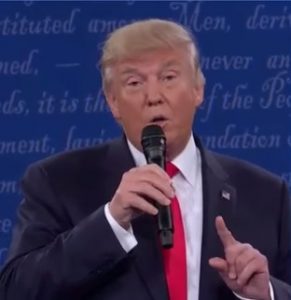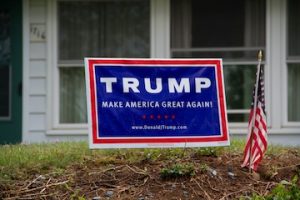:
Does Trump have hidden support in Pennsylvania?
The ‘Undercover Trump Voter’: A ‘Reverse Bradley Effect?’
Donald Trump is pandering to angry, often under-educated and politically unsophisticated voters in Pennsylvania and elsewhere. So are voters shy to tell pollsters of their real voting intentions?
Is Donald Trump’s support in Pennsylvania stronger than polls suggest?
In the last several weeks pollshave placed Hillary Clinton anywhere from 12 to 4 points ahead of Trump in the Keystone State.
But are these polls inaccurate? Or are people misleading pollsters by not honestly saying they intend to vote for Trump, out of various motivations, including being thought less of?
There are anecdotal reasons to think so.
Driving around central Pennsylvania and northern Maryland, Trump yard signs far outnumber Hillary Clinton’s. And there is vehement and loud support for Trump on social media.
So for months I’ve suspected there are substantial numbers of perspective voters who simply are misleading the pollsters.
There’s precedent for this, and it’s called the Bradley Effect.
The Bradley Effect was named for former Los Angeles Mayor Tom Bradley, who ran for governor of California in 1982.
Going into the election, Bradley, who was black, led in the polls against his lesser-known, white opponent, Republican candidate George Deukmejian. The day after the election Bradley was even declared the winner by the San Francisco Chronicle.
But when absentee votes were counted, it was discovered that Bradley in fact had narrowly lost to Deukmejian.
What happened?
Analysts, pollsters and academics poured over the results, and found that fewer whites had voted for Bradley than pollsters had anticipated, and that undecided voters had broken for Deukmejian in “statistically anomalous numbers.”
In other words, voters had been fibbing to the pollsters. But why?
In Bradley’s case, researchers suggested racism. As Wikipedia explains:
“The Bradley Effect posits that the inaccurate polls were skewed by the phenomenon of social desirability bias. Specifically, some white voters give inaccurate polling responses for fear that, by stating their true preference, they will open themselves to criticism of racial motivation. Members of the public may feel under pressure to provide an answer that is deemed to be more publicly acceptable, or ‘politically correct.’”
With Trump there could be a similar ‘social desirability bias’ at play. Potential Trump voters may simply be uncomfortable telling pollsters that they plan to vote for a widely socially unacceptable candidate.
In recent weeks this theory has emerged nationally, and has been called a “Reverse Bradley Effect,” since this time it involves voters who are concealing their support for Donald Trump, the male populous candidate.
Removing race as a motivation, as is in Trump’s case, you still have a ‘social desirability bias.’
A boorish lout who traffics in the politically incorrect, Donald Trump has tapped into some of the darkest instincts in our country.
“As terrible as Donald Trump is, as many people as he has alienated, he still is not out of contention,” State Rep. Mark Cohen (R-Philadelphia) this week posted on Facebook. “He has tapped into the forces of racism and white nationalism, which, as I know from personal experience, are tremendously powerful.”
“And his career is based on his extraordinary ability to tap into the power of fantasy: his casinos are palaces of fantasy; his Alpha Male persona is about appealing to fantasy; his Trump University used fantasies of wealth to exploit the naive and inexperienced.”
“I think Hillary Clinton will win, but the race will wind up much closer than many people expect it to be.”
Nationally, even Trump’s supporters have begun to refer to the Reverse Bradley Effect, and how it may help Trump.
In recent weeks a slew of conservative websites and Trump supporters have claimed support for Trump is much stronger than polls would have us believe.
Trump campaign manager Kellyanne Conway in late August went so far as to tell Britain’s Channel 4 that, at the time, Trump was actually ahead of Clinton.
“The hidden Trump vote in this country is a very significant proposition,” Conway told Channel 4. “I can’t discuss it. It’s a project we’re doing internally. I call it the undercover Trump voter, but it’s real.”
“Donald Trump performs consistently better in online polling where a human being is not talking to another human being about what he or she may do in the election,” she argued. “It’s because it’s become socially desirable, if you’re a college educated person in the United States of America, to say that you’re against Donald Trump.”
Trump deliberately panders to the under-educated, culturally affronted by certain changes, and often economically suffering voters who feel the need to lash out against all leaders in Pennsylvania and elsewhere, without adequate knowledge of who and what are responsible for what has been occurring.
For example, few would understand the issue of how, when the stock market crashed in the late-2000s, conservative insistence on austerity may have prevented necessary fiscal stimulus that would have rapidly provided jobs, and more equitably and far sooner lifted the nation out of the Great Recession. Instead those who sought to promote employment are indiscriminately tarred with the same brush as those who may have retarded recovery.
It could be that many Trump supporters — our friends, neighbors, co-workers and often family members — are very bright and successful in their careers, but they have not had the time or perhaps the inclination to acquaint themselves with evolving issues and events. Sports and entertainment rather than world affairs are their interests. But they are often hurting and always disturbed by what is taking place.
Other Trump supporters may simply be plain dumb.
“I love the poorly educated!” Trump famously told a rally this February.
And those voters may be shy to tell pollsters their real intentions.
(In Britain, a similar dynamic is called the Shy or Secret Tory Syndrome. “2015 saw the rise of the Secret Tory,” the U.K’s Independent newspaper explains. “Conservatives who, whether it be because they’re genuinely embarrassed about their views or fearful of the scorn of liberal friends, keep [quiet] about voting [for the conservative Tory party.”] )
There is another sign that the under-educated may be a powerful voting block in Pennsylvania.
In the current ballot initiative to extend the retirement age of Pennsylvania judges to 75, for instance, critics have charged that the state courts and the Republican leadership have deliberately confused the wording of the ballot question to pander to the state’s legions of uninformed and tuned-out voters.
What does that say about Pennsylvania, its government and its citizens?
State courts and the GOP leadership may know something about Pennsylvania’s legions of hostile voters. After all, they deal with them on a daily basis for jury duty, and in GOP county political committee meetings.



